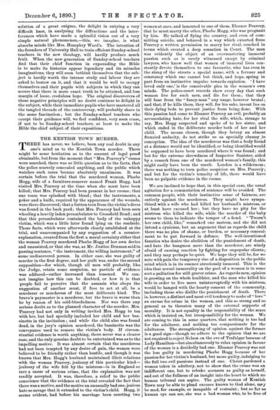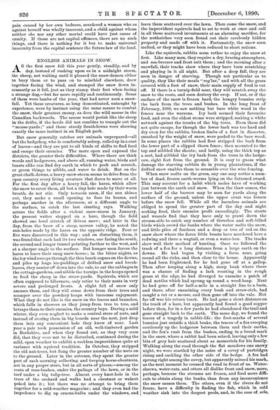THE KENTISH TOWN MURDER.
THERE has never, we believe, been any real doubt in any one's mind as to the Kentish Town murder. There might be some hesitation as to the amount of legal proof obtainable, but from the moment that " Mrs. Pearcey's " rooms were searched, there was so little question as to the facts, that the police scarcely concealed anything, and the public which watches such cases became absolutely unanimous. It was certain before the trial that the murdered woman, Phcebe Hogg, wife of a furniture-remover named Frank Hogg, had visited Mrs. Pearcey at the time when she must have been killed; that Mrs. Pearcey had been present in her rooms ; that one room was splashed with blood; that the instruments, a poker and a knife, required by the appearance of the wounds, were there discovered; that a button torn from the victim's dress was found in the back yard ; that Mrs. Pearcey had been seen wheeling a heavily laden perambulator to Crossfield Road ; and that this perambulator contained the body of the unhappy victim, which was a little later found lying on the roadside. Those facts, which were afterwards clearly established at the trial, and unaccompanied by any suggestion of a counter- explanation, created from the first a moral certainty either that the woman Pearce), murdered Phcebe Hogg of her own device and unassisted, or that she was, as Mr. Justice Denman said in passing sentence, " the instrument, the willing instrument," of some undiscovered person. In either case, she was guilty of murder in the first degree, and her guilt was, under the second supposition—for which, though all men will probably, like the Judge, retain some suspicion, no particle of evidence was adduced—rather increased than lessened. We can- not imagine how this can be doubted, or how it is that people fail to perceive that the assassin who obeys the suggestion of another must, if free to act at all, be a murderer or murderess of the most deliberate kind. The bravo's paymaster is a murderer, but the bravo is worse than he by reason of his cold-bloodedness. Nor was there any serious doubt as to the planned character of the murder. Mrs. 'Pearcey had not only in writing invited Mrs. Hogg to tea with her, but had specially included her child and her bas- sinette in the invitation ; and while the child also was found dead, in the jury's opinion murdered, the bassinette was the conveyance used to remove the victim's body. If circum- stantial evidence is worth anything, there never was a clearer case, and the only genuine doubt to be entertained was as to the impelling motive. It was almost certain that the murderess had not been tempted by any desire of gain, the women were believed to be friendly rather than hostile, and though it was known that Mrs. Hogg's husband maintained illicit relations with the woman Pearcey, jealousy of this particular kind— jealousy of the wife felt by the mistress—is in England so rare a cause of serious crime, that the explanation was not readily accepted. It was, therefore, a relief to the public conscience that the evidence at the trial revealed the fact that there was a motive, and the motive an unusually bad one, jealous hate so savage that it extended to the victim's child. Hogg, it seems evident, had before his marriage been courting two women at once, and lamented to one of them, Eleanor Pearcey, that he must marry the other, Phcebe Hogg, who was pregnant by him. He talked of flying the country, and even of com- mitting suicide, and behaved in a way which extorted from Pearcey a written permission to marry her rival, couched in terms which created a deep sensation in Court. The man was evidently the object of an overmastering immoral passion such as is rarely witnessed except by criminal lawyers, who know well that women of immoral lives con- stantly devote themselves to one favourite, who has even in the slang of the streets a special name, with a fervour and constancy which one cannot but think, and hope, spring in part from an instinctive impulse towards expiation. I have loved only one,' is the conceivable plea in the women's own minds. The police-court records show every day that such women live for such men, and die for them ; that they will bear from the " fancy-man " any usage, however brutal ; and that, if he kills them, they will, for his sake, invent lies on their dying beds to prevent justice from being done. With this passion had come to Eleanor Pearcey an evil, probably a,n accumulating hate, for her rival the wife, which, strange to say, Mrs. Hogg suspected and spoke of to her sister, and which ended in the deliberate murder both of her and her child. The means chosen, though they betray an almost frenzied audacity, do not strike us as specially clumsy in conception. The idea of the murderess was that a body found at a distance would not be identified, or being identified would be supposed to have been murdered where it was found; and but for the extreme shrewdness of Inspector Banister, aided by a remark from one of the murdered woman's family, this might easily have been the result. London is a wilderness ; there was nothing to turn police suspicion on Mrs. Pearoey ; and but for the victim's tenacity of life, there would have been no palpable evidence in the rooms.
We are inclined to hope that, in this special case, the usual agitation for a commutation of sentence will be avoided. The common people, with their instinctive sense of fairness, are entirely against the murderess. They might have sympa- thised with a wife who had killed her husband's mistress, or at least have excused her ; but they have no pity for the mistress who killed the wife, while the murder of the baby seems to them to indicate the temper of a fiend. " 'Tworn't her own child, like," remarked one matron, and she did not intend a cynicism, but an argument that as regards the ohild there was no plea of shame, or burden, or necessary conceal- ment to be put forward in defence. The well-intentioned fanatics who desire the abolition of the punishment of death, and hate the hangman more than the murderer, are wisely afraid of causing reaction by fighting for unpopular clients; and they may perhaps be quiet. We hope they will be, for we note with pain the temporary rise of a disposition in the public mind which is in its essence atrociously immoral. This is the idea that sexual immorality on the part of a woman is in some sort a palliation for still graver crime. As regards men, opinion is growing on the whole healthier, and the man who killed his wife in order to live more uninterruptedly with his mistress, would be hanged with the hearty consent of the community, including those who dislike the punishment of death. There is, however, a distinct and most evil tendency to make of " love " an excuse for crime in the woman, and this so strong and so general as to threaten many of the external supports of morality. It is not equality in the responsibility of the sexes which is insisted on, but irresponsibility for the woman. We are coming to this in some quarters, that nothing is too bad for the adulterer, and nothing too compassionate for the adulteress. The strengthening of opinion against the. former is a good sign—though we adhere to the opinion that we are not required to reject Nelson on the eve of Trafalgar because of Lady Hamilton—but simultaneously to relax opinion in favour of the woman is a decidedly bad one. Eleanor Pearcey was not the less guilty in murdering Phcebe Hogg because of her passion for her victim's husband, but more guilty, indulging to the full two evil passions instead of one. Christ pardoned a woman taken in adultery, not to show that the crime was an indifferent one, but to rebuke accusers as guilty as herself, and out of the fullness of an insight into the heart to which no human tribunal can aspire. The guilty woman of kentish Town may be able to plead excuses known to God alone, mry be mad, for example, or incapable of restraint ; but so far as human eye can see, she was a bad woman who, to be free of
pain caused by her own badness, murdered a woman who as against herself was wholly innocent, and a child against whom neither she nor any other mortal could have just cause of enmity. If those are not capital offences, there are no such things, and there is nothing for it but to make universal immunity from the capital sentence the future law of the land.























































 Previous page
Previous page